A bodybuilding meal plan is a crucial component of any successful bodybuilding program. Proper nutrition is essential for building muscle, increasing strength, and improving overall athletic performance.
Bodybuilders need to consume the right amount of macronutrients (protein, carbohydrates, and fats) to fuel their workouts and support muscle growth.
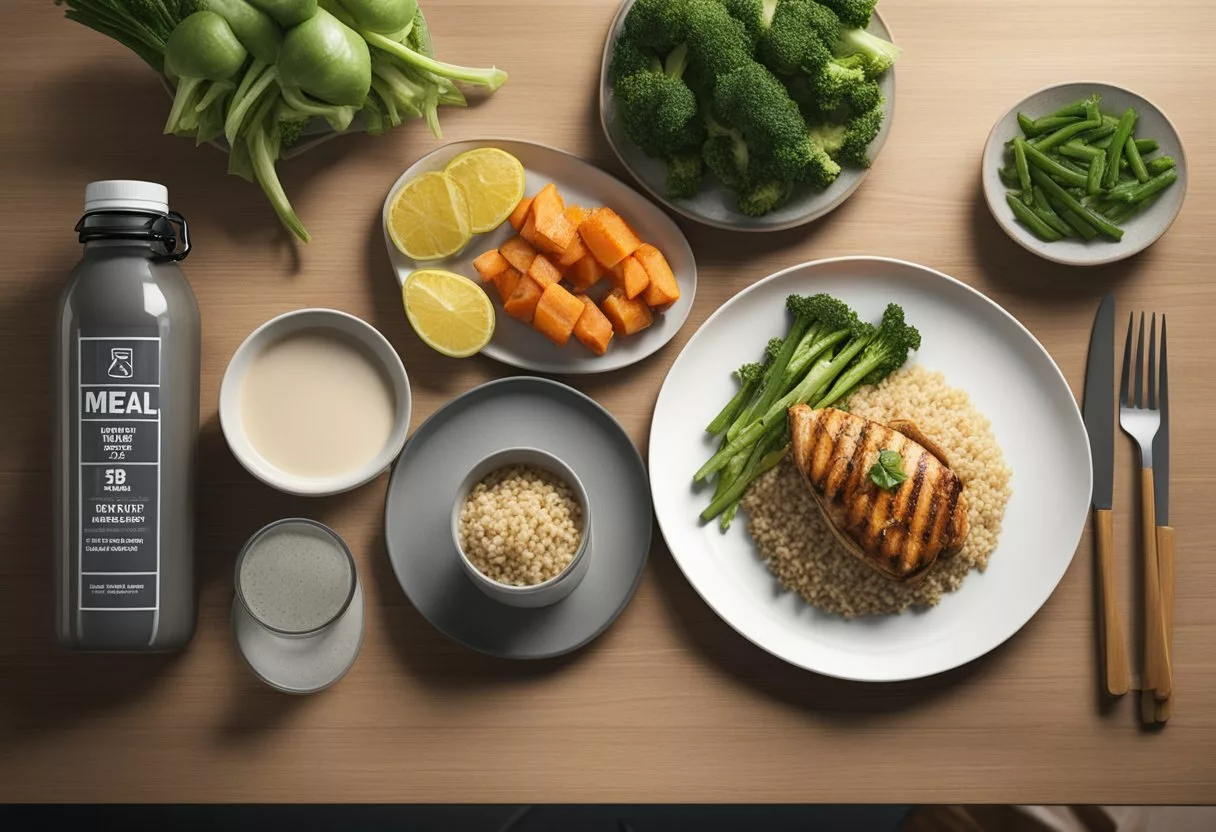
A bodybuilding meal plan can be overwhelming to design, but it doesn't have to be. There are many resources available, including sample meal plans and guidelines for meal components and food choices.
Supplements can also be incorporated into a bodybuilding meal plan, but they should not be relied upon as the sole source of nutrition.
Key Takeaways
- Proper nutrition is essential for bodybuilding success.
- Understanding macronutrients and nutrient timing is key to creating an effective meal plan.
- Sample meal plans and guidelines for meal components and food choices can help simplify the process of designing a bodybuilding meal plan.
Understanding Nutrition for Bodybuilding
When it comes to bodybuilding, nutrition plays a crucial role in achieving progress. A well-designed meal plan can help individuals build muscle, increase strength, and improve overall athletic performance.
Macronutrients
Macronutrients are the nutrients that provide energy to the body and are required in large amounts. They include protein, carbohydrates, and fats.
For bodybuilders, each macronutrient plays a vital role in building muscle and improving athletic performance.
Protein is essential for muscle growth and repair. It provides the building blocks necessary for muscle tissue synthesis.
Bodybuilders need to consume more protein than the average person. Good sources of protein include lean meats, poultry, fish, eggs, and dairy products.
Carbohydrates provide energy for workouts and replenish glycogen stores, while healthy fats support hormone production and overall health.
It's also important to consider nutrient timing, as consuming the right nutrients at the right time can enhance muscle protein synthesis and recovery.
Micronutrients and Hydration
Micronutrients are the nutrients required in smaller amounts, such as vitamins and minerals. They are essential for overall health and well-being.
Bodybuilders also need a sufficient amount of micronutrients to support muscle growth and athletic performance. Good sources of micronutrients include fruits, vegetables, whole grains, and lean meats.
Hydration is also essential for bodybuilding. Water is required for many bodily functions, including digestion, nutrient absorption, and waste removal.
Bodybuilders need to drink at least 8-10 glasses of water per day to support muscle growth and athletic performance.
Designing Your Bodybuilding Meal Plan
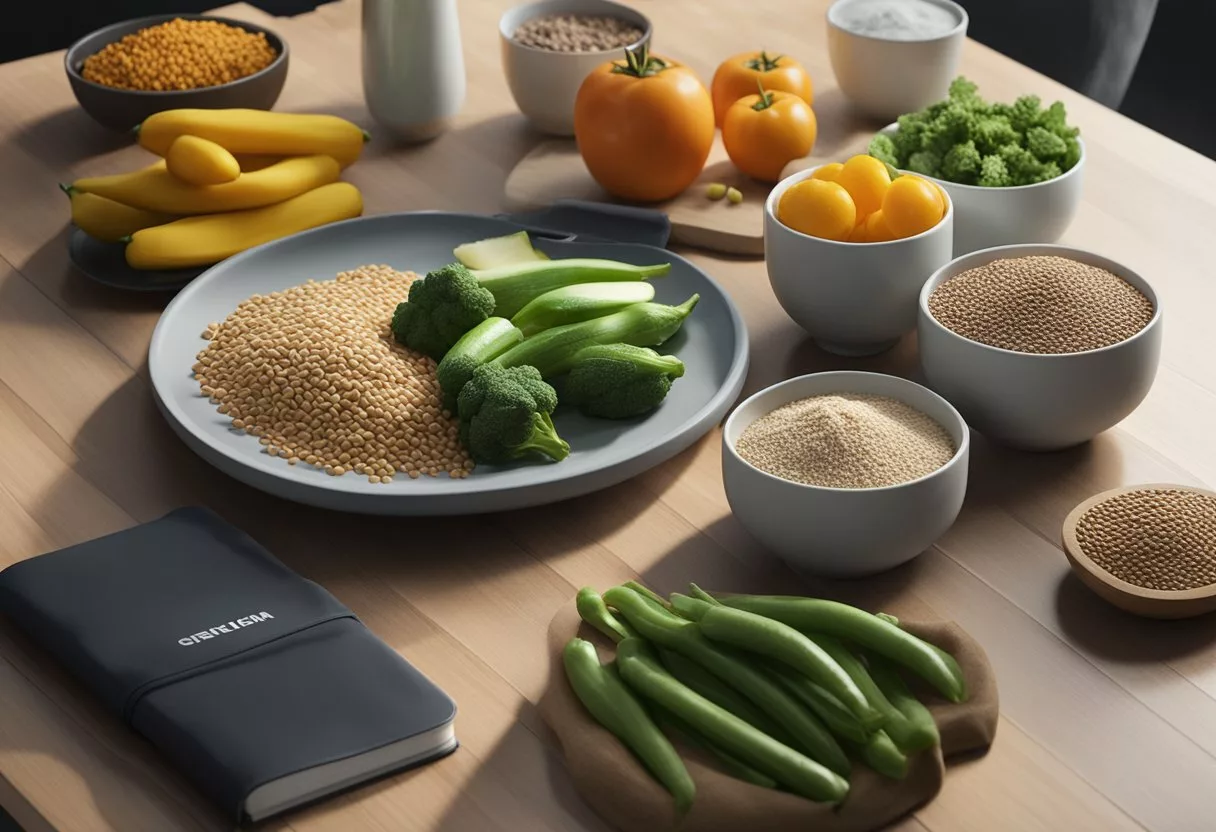
When designing a bodybuilding meal plan, there are a few key factors to consider. This section will cover how to calculate your caloric needs and meal timing and frequency.
Calculating Caloric Needs
To build muscle mass, you need to consume more calories than you burn. This is known as a caloric surplus. However, you need to find the right balance between consuming enough calories to build muscle and not consuming too many calories that lead to fat gain.
To calculate caloric needs, you can use an online calculator or a formula that takes into account factors such as age, gender, weight, height, and activity level.
Once you have a calorie goal, you need to distribute these calories throughout the day in a way that supports muscle growth.
Meal Timing and Frequency
Meal timing and frequency are also important factors to consider when designing a bodybuilding meal plan.
It is recommended to eat every 3-4 hours to support muscle growth and recovery. This means consuming 4-6 meals per day.
Pre-workout meals should consist of fast-digesting carbohydrates, such as fruit or juice, consumed 30 minutes before training.
For a meal 1-2 hours before training, you should consume a combination of fast-digesting protein, such as whey protein, and a carbohydrate source.
For a meal 3 hours or more before training, a regular meal with protein, carbohydrates, and fat is recommended.
Post-workout meals should consist of fast-digesting carbohydrates and protein to support muscle recovery and growth. Snacks throughout the day can also be incorporated to meet caloric needs and support muscle gain.
Meal Components and Food Choices
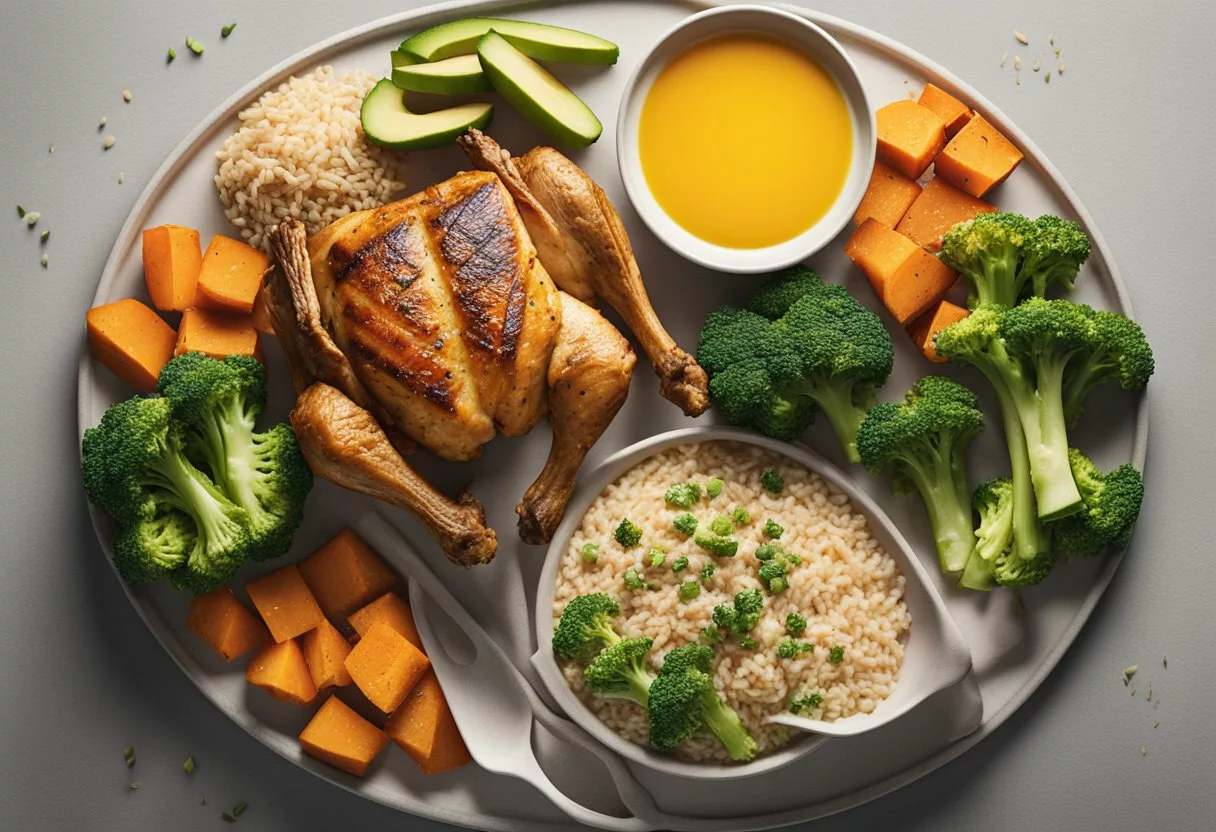
When it comes to bodybuilding, a well-rounded meal plan is essential for building muscle and maintaining overall health.
A balanced meal should include protein, carbohydrates, and healthy fats, as well as a variety of fruits and vegetables. Here are some recommended meal components and food choices for a bodybuilding meal plan.
Protein-Rich Foods
Protein is an essential nutrient for building and repairing muscle tissue. Good sources of protein include chicken, beef, fish, eggs, and whey protein.
Lean protein sources such as chicken breast and fish are recommended for bodybuilding meal plans as they are low in fat and high in protein. Other protein sources include plant-based options like beans, lentils, tofu, and tempeh.
Carbohydrate Sources
Carbohydrates are an important energy source for the body, especially during intense workouts.
Good sources of carbohydrates include oats, brown rice, quinoa, potatoes, and fruits.
Complex carbohydrates like sweet potatoes and brown rice are recommended as they provide sustained energy throughout the day.
It's important to note that not all carbohydrates are created equal, and bodybuilders should avoid simple carbohydrates like sugary drinks and candy.
Fats and Oils
Healthy fats are important for maintaining overall health and providing energy. Good sources of healthy fats include olive oil, nuts, seeds, avocado, and coconut oil.
It's important to consume healthy fats in moderation, as they are high in calories.
Fruits and Vegetables
Fruits and vegetables are important sources of vitamins, minerals, and fiber.
Good sources of fruits and vegetables include berries, kale, spinach, broccoli, and sweet potatoes. A variety of fruits and vegetables should be included in a bodybuilding meal plan to ensure the body receives a range of essential nutrients.
Supplements for Muscle Building
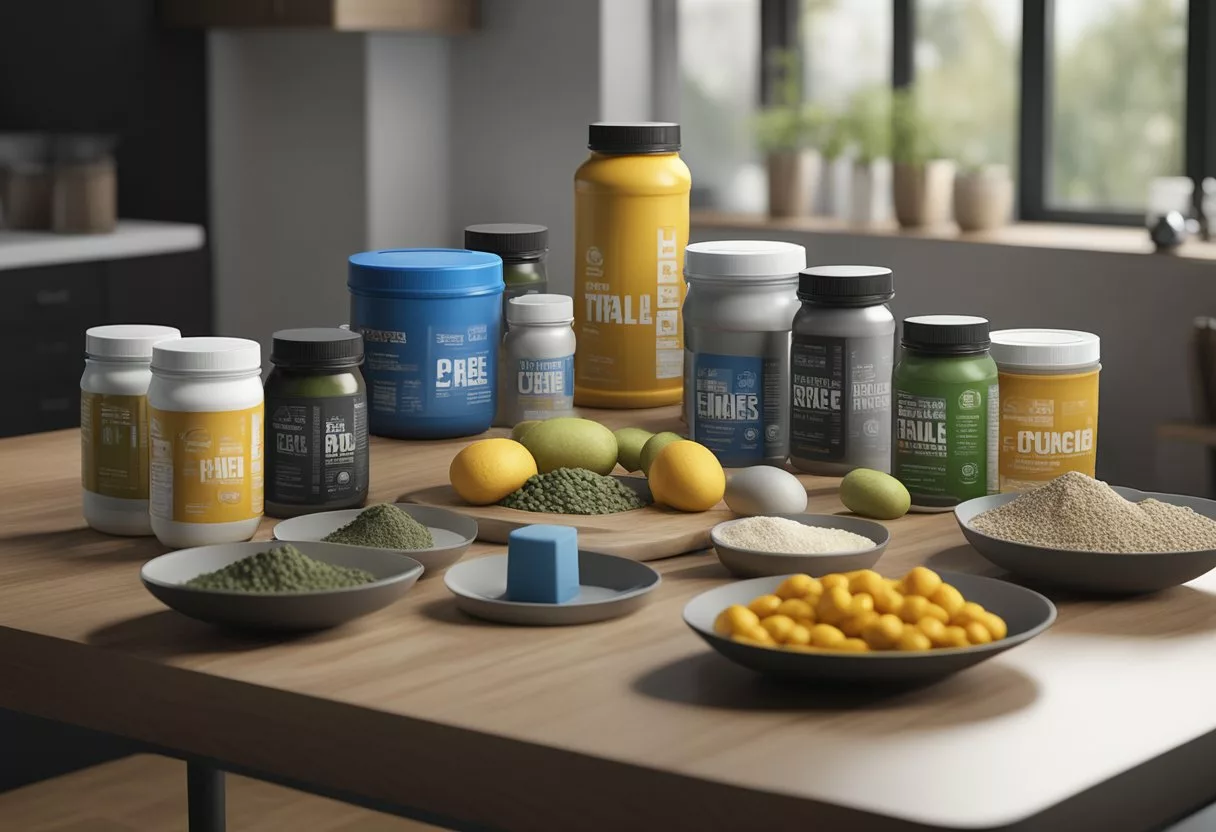
Supplements can play an important role in helping individuals achieve their bodybuilding goals. However, it's important to remember that supplements should not be used as a replacement for a healthy diet and consistent exercise routine.
Protein Powders and Amino Acids
Protein powders and amino acids are commonly used by bodybuilders to support muscle growth and recovery.
Whey protein is a popular choice due to its high bioavailability and fast absorption rate. It is important to choose a high-quality protein powder that is low in additives and fillers.
Amino acids, particularly branched-chain amino acids (BCAAs), are also commonly used to support muscle growth and recovery.
BCAAs are essential amino acids that cannot be produced by the body and must be obtained through diet or supplementation.
Performance Enhancers
Performance enhancers, such as creatine and caffeine, are often used by bodybuilders to improve strength and endurance during workouts.
Creatine is a naturally occurring compound that can be found in small amounts in meat and fish. Supplementation with creatine has been shown to increase muscle mass, strength, and power.
Caffeine is a stimulant that can improve focus, energy, and endurance during workouts. However, it is important to use caffeine in moderation and avoid consuming too much, as it can lead to negative side effects such as jitters and anxiety.
Remember that supplements should be used in conjunction with a healthy diet and consistent exercise routine. You should also consult with a healthcare professional before beginning any new supplement regimen.
Sample Meal Plans
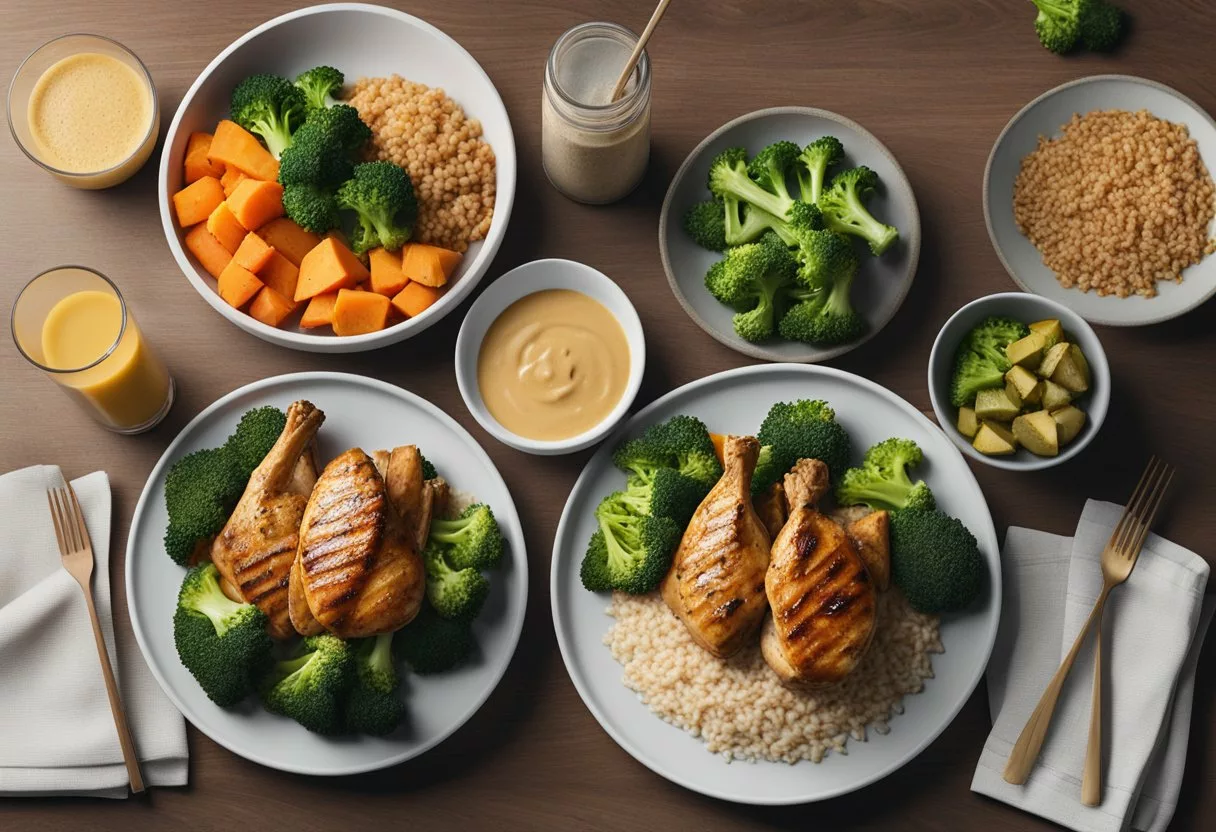
When it comes to bodybuilding, diet is just as important as exercise. A well-planned meal plan can help build muscle mass, reduce body fat, and provide the necessary nutrients for optimal performance.
In this section, we will provide two sample meal plans for the building and cutting phases of bodybuilding.
Building Phase Plan
During the building phase, the goal is to consume more calories than the body burns to build muscle mass.
A typical building phase meal plan should consist of high-quality protein, complex carbohydrates, and healthy fats.
Here is a sample building phase meal plan for a 180-pound male:
| Meal | Food |
|---|---|
| Breakfast | 4 eggs, 2 slices of whole-grain toast, 1 cup of oatmeal |
| Mid-morning snack | 1 apple, 1 scoop of whey protein |
| Lunch | 6 oz. of grilled chicken breast, 1 cup of brown rice, 1 cup of steamed vegetables |
| Mid-afternoon snack | 1 banana, 1 tbsp. of almond butter |
| Pre-workout meal | 6 oz. of grilled salmon, 1 sweet potato |
| Post-workout meal | 6 oz. of grilled sirloin steak, 1 cup of quinoa, 1 cup of steamed vegetables |
| Before bed snack | 1 cup of cottage cheese, 1 tbsp. of flaxseed oil |
Cutting Phase Plan
During the cutting phase, the goal is to reduce body fat while maintaining muscle mass.
A typical cutting phase meal plan should consist of low-fat protein, complex carbohydrates, and healthy fats.
Here is a sample cutting phase meal plan for a 180-pound male:
| Meal | Food |
|---|---|
| Breakfast | 4 egg whites, 1 slice of whole-grain toast, 1 cup of oatmeal |
| Mid-morning snack | 1 pear, 1 scoop of whey protein |
| Lunch | 6 oz. of grilled chicken breast, 1 cup of quinoa, 1 cup of steamed vegetables |
| Mid-afternoon snack | 1 orange, 1 tbsp. of almond butter |
| Pre-workout meal | 6 oz. of grilled salmon, 1 sweet potato |
| Post-workout meal | 6 oz. of grilled sirloin steak, 1 cup of brown rice, 1 cup of steamed vegetables |
| Before bed snack | 1 cup of low-fat cottage cheese, 1 tbsp. of flaxseed oil |
Adjusting the Plan for Optimal Results
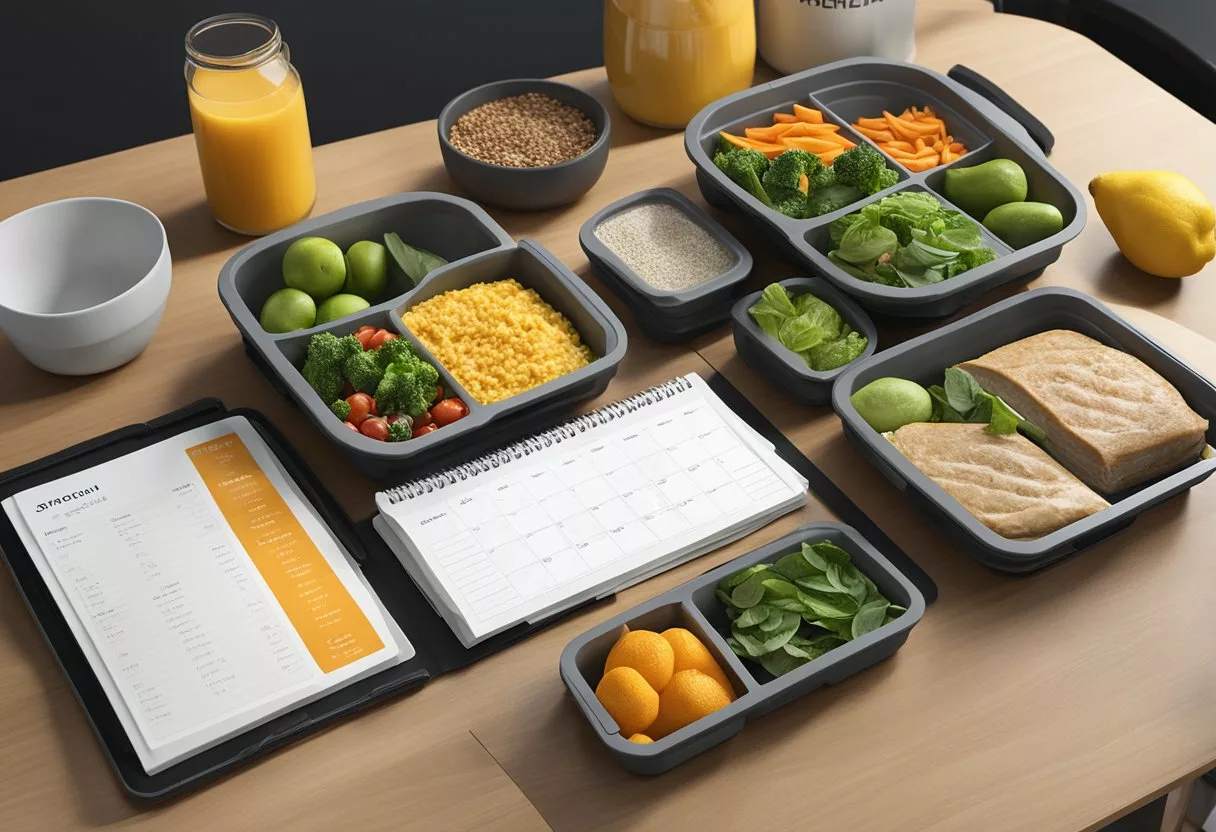
Monitoring Progress
Once you have started on your bodybuilding meal plan journey, it is important to monitor your progress regularly.
This can be done by tracking your weight, body fat percentage, and muscle mass. By doing so, you can determine whether or not you are making effective progress towards your goals.
Modifying Intake Based on Goals
Depending on your goals, you may need to make adjustments to your calorie and macronutrient intake.
For example, if you are looking to gain muscle mass, you may need to increase your calorie intake.
On the other hand, if you are looking to lose body fat, you may need to decrease your calorie intake.
Remember to make these adjustments gradually and ensure that your body is still getting all the necessary nutrients.
Practical Tips for Meal Preparation
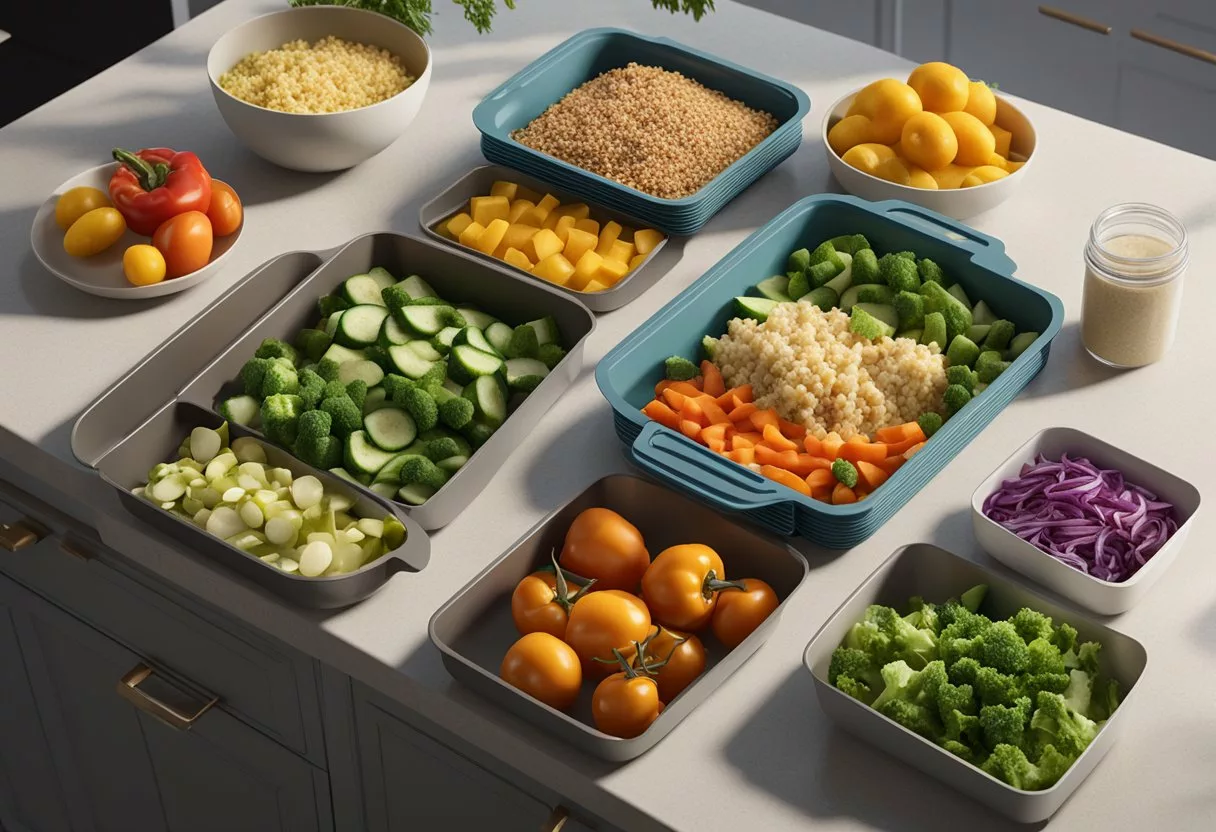
Preparing meals in advance is an essential part of a successful bodybuilding meal plan. Here are some practical tips to help make meal prep easier and more convenient.
Cooking and Storage
Cooking in bulk is an excellent way to save time during the week.
Consider preparing large batches of protein, such as chicken or beef, and storing them in the refrigerator or freezer.
You can also cook a large quantity of rice or quinoa and store them in separate containers, ready to be reheated.
When storing food, make sure to use airtight containers to prevent spoilage and maintain freshness. Glass containers are an excellent option as they are microwave and dishwasher safe, and they don't leach harmful chemicals into your food.
Eating on the Go
Eating on the go is a common challenge for bodybuilders who need to eat frequently throughout the day.
One solution is to pack snacks that are easy to carry and require no preparation, such as nuts, yogurt, or fruit.
Another option is to prepare meals that can be eaten cold, such as salads or sandwiches. These can be stored in a cooler bag with an ice pack and taken with you wherever you go.
It's also important to plan ahead and know where you can find healthy meal options when you're away from home. Research local restaurants or cafes that offer nutritious meals, or pack a meal replacement shake to ensure you're getting the nutrients you need.
Frequently Asked Questions
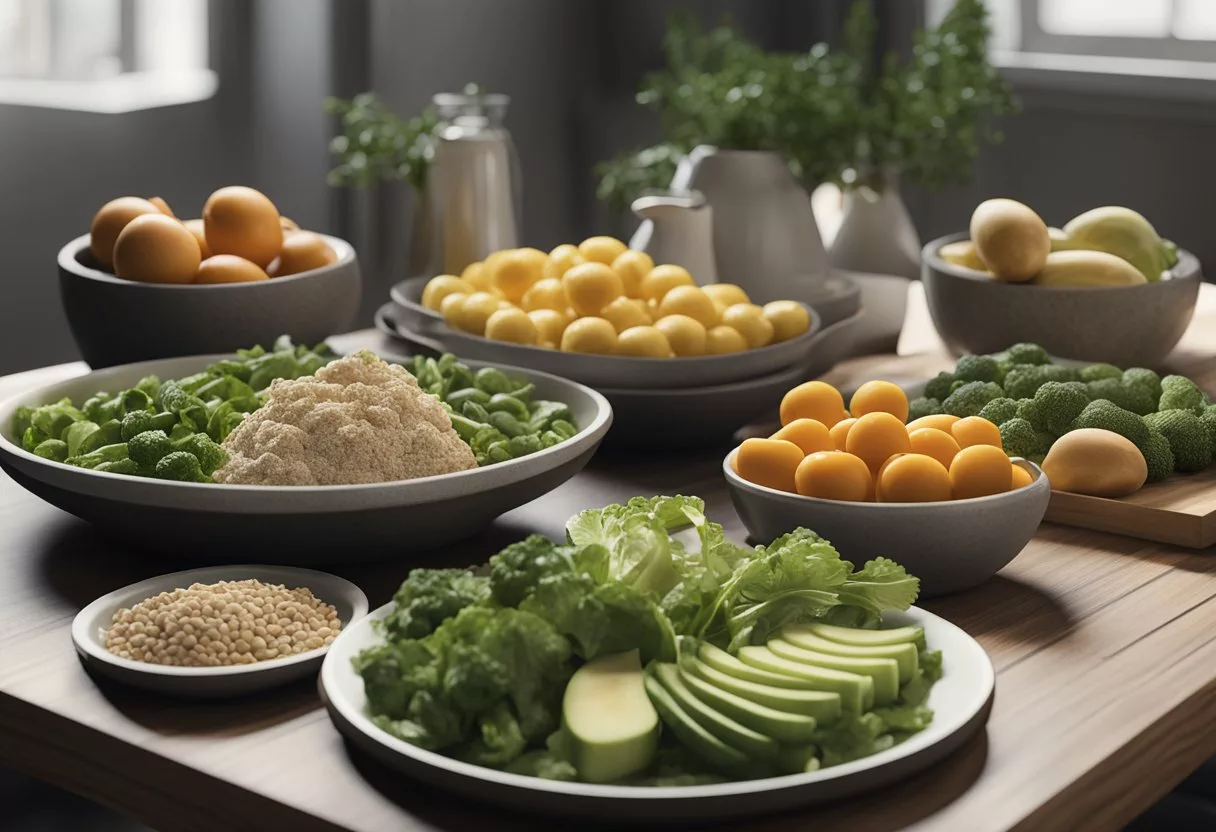
What are the essential components of a meal plan for muscle gain?
A meal plan for muscle gain should consist of a balance of macronutrients, including protein, carbohydrates, and healthy fats.
Protein is essential for building and repairing muscle tissue, while carbohydrates provide energy for workouts and recovery. Healthy fats are important for hormone regulation and overall health.
How can a beginner effectively structure a bodybuilding diet?
A beginner should start by calculating their daily calorie needs and macronutrient ratios.
They should then focus on consuming whole, nutrient-dense foods such as lean proteins, complex carbohydrates, and healthy fats.
It is also important to stay hydrated and consume enough fiber to support digestion.
What are some cost-effective foods for a bodybuilding diet?
Some cost-effective foods for a bodybuilding diet include chicken breast, canned tuna, eggs, brown rice, sweet potatoes, and frozen vegetables. These foods are relatively inexpensive and provide a good balance of macronutrients.
How should a meal plan differ for cutting versus bulking in bodybuilding?
When cutting, a meal plan should focus on a calorie deficit while maintaining a balance of macronutrients.
This can be achieved by reducing overall calorie intake and increasing protein consumption to preserve muscle mass.
When bulking, a meal plan should focus on a calorie surplus while increasing protein and carbohydrate intake to support muscle growth.
What is an example of a daily meal plan for a female bodybuilder?
A daily meal plan for a female bodybuilder could include:
- Breakfast: Greek yogurt with berries and almonds
- Mid-morning snack: Apple slices with almond butter
- Lunch: Grilled chicken breast with brown rice and mixed vegetables
- Mid-afternoon snack: Protein shake with banana and spinach
- Dinner: Baked salmon with sweet potato and asparagus
- Evening snack: Cottage cheese with pineapple
How can someone integrate multiple small meals throughout the day for bodybuilding purposes?
To integrate multiple small meals throughout the day, someone should focus on consuming nutrient-dense foods every 2-3 hours. This can include snacks such as protein bars, nuts, and fruit.
Planning ahead and preparing meals in advance is important to ensure that they are balanced and meet individual macronutrient needs.